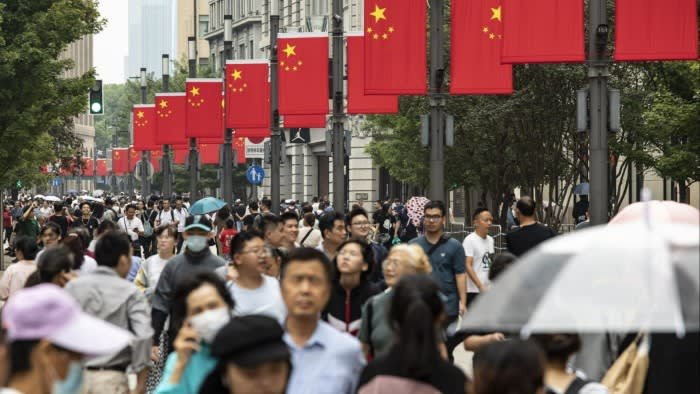The writer is founder and chief economist of Enodo Economics. She is also senior fellow on Chinese Economy at the Asia Society Policy Institute’s Center for China Analysis.
My friend Wang seems to have it all. A finance professional in shiny Shanghai, Wang has earned his success. He was the first of his farming family to go to college; then the first to go abroad to study and work in the UK. China kept calling — his parents were broody for grandchildren — so Wang headed home to a lucrative job in the country’s sprawling financial sector.
He married his college sweetheart and this summer showed me their second child, a beautiful, bawling infant who makes Wang’s parents happy and his government too. The couple can expect subsidies and cheaper childcare as the authorities hustle to reverse the population collapse accelerated by China’s former “one-child” policy.
For decades the PRC has grown strongly, delivered higher standards of living nationwide and fired the dreams of millions of fresh graduates hoping to follow in Wang’s footsteps. But Wang worries about being able to support his growing family in an economy that’s seen better days. He’s working much harder for less money as Chinese leader Xi Jinping clamps down on the finance sector. His apartment is worth less and his savings are earning next to nothing in bank deposits.
Wang, who’s considering a move to Hong Kong, is among many people in China’s financial industry who have told me they’re feeling the chill from Xi’s income and wealth redistribution efforts. Plans are afoot to cap annual pay at all state-backed financial institutions at around $412,000, and demand retroactive repayments. Many financial firms have already cut salaries and bonuses, and asked staff not to wear expensive watches and clothes to work. China’s anti-graft watchdog has vowed to eliminate ideas of a Western-style “financial elite” and rectify the hedonism of excessive pursuit of “high-end taste”, according to Reuters.
Of course, ambitious finance professionals in China still enjoy rewards that are hard to match in other careers. The average annual salary in urban China remains under $17,000. But their complaints and the political factors behind them matter to the world: a stagnating, sullen China would weigh heavily on the global economy.
Wang’s worries about the future help explain China’s extraordinarily weak consumption, the Achilles heel of the economy. Household consumption accounts for just 37 per cent of GDP, compared with 68 per cent in the US. More spending is crucial to revive China’s flagging performance.
The finance sector is just Xi’s latest target. He has previously clamped down on internet platform companies, the after school tutoring sector and the real estate sector. It is all part of Xi’s sweeping mission to narrow China’s wide income and wealth gap.
But Xi’s strategy can succeed only if it doesn’t kill off the incentive of the well-educated middle class to get on in life. In China, the Communist Party largely determines interest rates, exchange rates and the flow of credit to companies and households. It is thus able to channel people’s savings to those parts of the economy that best serve its interests. It is also able to peg bank deposit rates below the rate of inflation, punishing savers. And by means of capital controls, it prevents people from investing much of their money overseas.
Through these and other measures, Chinese households find it difficult to grow their wealth and receive a decent income from their assets. Most Chinese wealth is invested in real estate, so the slide in house prices is cutting deep into household wealth. And the stock market in China is still more of a casino than a trustworthy investment alternative. The upshot is that households are saving more for a rainy day.
The Communist Party’s Third Plenum in July, which set economic priorities for the next half-decade, did produce some good policies supportive of the consumer. Pledges to give equal status to migrant workers who lack urban residency permits, to improve medical and social security provision and to lower education costs are all welcome. But the plenum was silent about the economy’s most pressing need: a redistribution of income from companies to households.
It’s true that the government has followed up with a raft of plans to prod consumers to save less and spend more. Measures include more elderly care, a five-year urbanisation plan and further support for a subsidy scheme to trade in cars and other goods for cleaner replacements. But these measures are just a band aid when what is required is major surgery. They are unlikely to persuade my friend Wang and consumers like him that the good times are returning.





